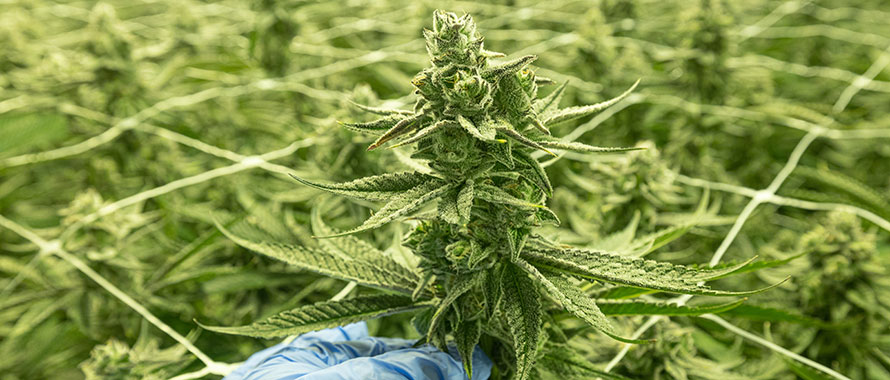Cannabis could be reclassified from a Schedule I to a Schedule III drug under a new rule recently proposed by the U.S. Justice Department, according to reports. While some experts say it represents a historic shift in policy, the proposed change would not legalize marijuana, but would ease federal restrictions on the substance and put it in the same class as ketamine and anabolic steroids, CBS News reported May 16.
Featured Solutions
“I think it is obviously good for the industry,” said Jason Scheurle, National Product Leader, Cannabis, Burns & Wilcox, based in Philadelphia, Pennsylvania. “It is not the ultimate, which would be a complete legalization, but it is still certainly a beneficial move and one that will assist these cannabis organizations with taxes. They will be able to act more as a customary business, which they have not been able to do.”

It is not the ultimate, which would be a complete legalization, but it is still certainly a beneficial move and one that will assist these cannabis organizations with taxes.
For business owners in the industry, the change could also be a step toward increased access to Cannabis Insurance policies, such as Commercial Property Insurance and Commercial General Liability Insurance, although “a huge shift or change in the insurance market” is not anticipated at this time, said Kelsey Schippers, Broker, Commercial Insurance, Burns & Wilcox, Denver, Colorado.
“Rescheduling it to a Schedule III drug means it would still be a controlled substance, so I do not see a lot of standard insurance carriers opening up the market. I think it is going to be a long process,” Schippers said. “However, you might have more surplus-lines carriers willing to consider the medical side of it that maybe have not in the past.”
Possible impact of rescheduling
Efforts to change marijuana’s classification as a Schedule I drug began in October of 2022 with an executive order from President Joe Biden pointing to the “failed policy” of listing the substance as more dangerous than fentanyl, according to MJBizDaily. Many business owners have expressed optimism about the proposed change, with one owner telling NBC News Chicago that he looked forward to the possibility of taking business tax deductions and another saying it would be a “huge first step” toward eventually removing the substance from the Controlled Substances Act completely.

[With the reclassification], you might have more surplus-lines carriers willing to consider the medical side of it that maybe have not in the past.
The change could also help with making marijuana easier for researchers to study, the Associated Press reported May 1, but it would not directly affect cannabis owners’ ongoing difficulty accessing banking.
“I think [the reclassification] could help get rid of some of the stigma around cannabis in the community, but it may not be the huge change that individuals might be expecting when they heard the news,” Schippers said.
According to Scheurle, the “premiere benefit” that is expected to come from the proposed change is the impact on tax deductions for business owners. “It is about giving them more access and treating them more like any other business,” he said. “It could help these business owners to just act as a traditional business [for tax purposes].”
It is unknown what impact the shift could have on the Cannabis Insurance market, but “what may happen is there may be some additional capacity, given the fact that it would be amended at the federal level,” he said. “That remains to be seen, ultimately,” Scheurle said.
More businesses join THC beverage boom
As cannabis business owners prepare for the impact of possible changes at the federal level, another trend in the industry is continuing to make waves. THC beverages are booming in many states where recreational cannabis use is legal, offering an increasingly popular alternative method of consumption. Minnesota is “at the forefront” of the market, according to the Eater Twin Cities online publication. THC beverages have been expanding in the state for over the past year and a half, with many breweries offering hemp seltzers and some restaurants including the drinks on their menus, the publication reported on May 6.
“I am starting to see THC beverages popping up a lot more,” Schippers said.
In Michigan, where THC beverages accounted for less than 0.34% of recreational marijuana sales in March of 2024, one company recently invested $6 million to build a canning operation for its THC beverages, Crain’s Detroit Business reported in April. THC beverages have also experienced major growth in Canada, where carbonated cannabis beverage sales in certain provinces accounted for $28 million in 2022, a 70% increase compared to 2021 data.
According to Schippers and Scheurle, the trend presents a unique challenge for the Cannabis Insurance market. In addition to seeking out coverages such as Products Liability Insurance and Product Recall Insurance, many companies offering THC beverages are looking to address potential intoxication-related liability and seeking out coverage similar to Liquor Liability Insurance.
“The THC beverages are a huge item right now,” Scheurle said. “They are growing, and more and more entities are looking to enter that space or perhaps offer it in their brewery. It is quickly becoming popular, but it is not without complication.”
The greatest challenge is the “lack of robust insurance solutions,” he said. Approximately five insurance carriers offer some coverage, but most businesses may have even fewer options, depending on their operations.
“When we talk about cannabis, the narrative all along has been that insurance is limited. If you look at a THC beverage operation, the risk is limited times 10 compared to a standard cannabis operation,” Scheurle explained. “It is going to be a challenge because of the unique mix of liquor liability blended with cannabis intoxication liability. The blending of those two exposures is very difficult for any underwriter to really rate adequately.”
In the event of a claim, he said, “it may be very difficult to determine what was the cause of the claim — beer, wine, or THC?”
“It is that complicated risk profile that is really limiting the choices available,” he said. However, as the popularity of these beverages continues to grow, more options may become available. “The beverages are not going away; they are actually rising in popularity,” Scheurle said. “It is just a matter of whether an insurance carrier will really figure out a rate and policy form structure they feel is adequate and will protect them.”

It is important for [cannabis] business owners to realize that they need to cover themselves for all aspects.
Serving both THC beverages and alcoholic beverages in the same setting is a challenge when it comes to insurance, Schippers agreed. “One shift we are seeing is that the carriers are really trying to shift and accommodate these changes. The tricky part is that they often do not want to write it if the beverages are being served in the same area where alcohol is being served,” she said. “There is a fine line of trying to determine what product was at fault [in the event of a claim]. I am hoping more carriers will start developing forms for this.”
Mitigating risks in a changing industry
Given the ever-evolving state of the cannabis industry in the U.S., business owners in the industry are encouraged to review their insurance policies with a specialized broker on a regular basis, particularly if they launch new products such as THC beverages.
According to Schippers, these business owners should look at their operations and associated risks from all angles. “It is important for business owners to realize that they need to cover themselves for all aspects,” she said. “Smaller cannabis businesses starting off may only get the insurance that they are required to get,” which could leave them open to a variety of uninsured losses.
For example, many business owners do not consider the need for a separate Product Recall Insurance policy in addition to the small endorsement they may have for recall expenses on their Products Liability Insurance. “There may be a recall endorsement, but it has to be triggered by a federal or state recall,” she said. “If you buy a true Product Recall Insurance policy, it does not need to be triggered by an actual bodily injury recall but can be triggered by an imminent bodily injury.”

These are complicated operations with high-value property on site, cash on site, and they are an ‘attractive nuisance’ to potential thieves. It is imperative that there is a risk management focus around the building and the operation itself.
Another alarming trend is an apparent increase in Commercial Property Insurance claims in which someone crashes their car into a cannabis business storefront. “Half the time they do not make out with anything — they do not realize cash is held in heavy-duty safes — but the business owner is left having to do the repairs to the building,” Schippers said. “It is important to make sure you are getting that property coverage, whether you are the building owner leasing to a marijuana business or if you are leasing the building.”
Other policies, including Cargo Insurance, are also important and should be discussed with a knowledgeable broker, Scheurle said. “These are complicated operations with high-value property on site, cash on site, and they are an ‘attractive nuisance’ to potential thieves,” he said. “It is imperative that there is a risk management focus around the building and the operation itself to ensure that they are adequately protected at all times.”
By communicating openly with your insurance broker, Scheurle said, misunderstandings can be avoided. “Clear communication with your broker about the operation is going to be key,” he said. “The last thing you want to do in a space that is so small, with so few options, is give misleading information that causes a carrier to pass on your risk — because you may not have many more options beyond that.”









